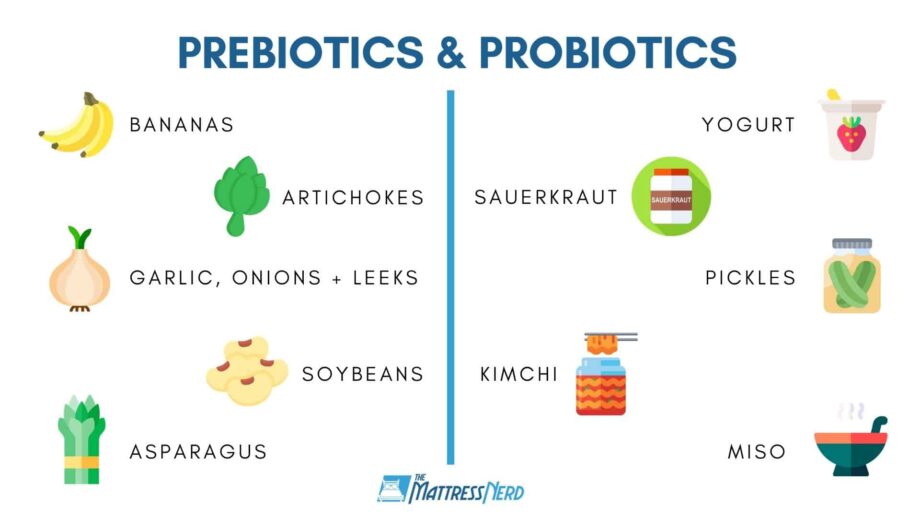Sleep and Gut Health
Disclosure: By clicking on the product links in this article, Mattress Nerd may receive a commission fee at no cost to you, the reader. Read full disclosure statement.

Can’t sleep? The problem may be in your gut. If your gastrointestinal tract isn’t healthy and its microbiome inhabitants well balanced, it can throw your physical and emotional health out of whack and ultimately disrupt your sleep. To make matters worse, sleep disruptions can have a negative impact on your gut. But don’t fret. With a little work you can get your gut and, in turn, your sleep, back in check
What is “Gut Health?”
The gut is the gastrointestinal system that travels from our mouths to our anus. Unspooled, this tube runs about 30 feet and involves numerous organs including the mouth, esophagus, stomach, pancreas, liver, gallbladder, small intestines, colon, and rectum. Technically called the “enteric nervous system of the gastrointestinal tract,” our gut is unique in that it uses the same chemicals and neurotransmitters as the brain (such as serotonin, dopamine, and GABA, short for gamma-aminobutyric acid) to help us digest food as well as alert the brain when something isn’t right. Since the gut can control its behavior independently of the brain, our guts are often referred to as our “second brain.” These two brains are in constant communication, a partnership called the gut-brain axis.
Within the gut is a virtual forest filled with trillions of microbiomes. Often called the gut microbiome or gut flora, these bacteria, yeasts, and viruses are beneficial to human health and in some cases, essential to our wellbeing. Keeping the right balance of these microorganisms is vital for our physical and mental health, immunity, and even sleep. If the wrong ones multiply and overpower the right ones, they can disturb the gut’s healthy balance, a condition known as dysbiosis.
What is Dysbiosis?
Any disruption in your gut flora can cause dysbiosis. Some examples include:
- Consuming more protein, sugar, or food additives than usual
- Unintentional ingestion of chemicals, such as pesticides on produce
- Alcohol
- Starting new medications, especially antibiotics
- Poor dental hygiene
- Stress or anxiety
- Unprotected sex
Symptoms of dysbiosis can vary depending on which bacteria are out of balance, and include:
- Bad breath
- Upset stomach
- Nausea
- Constipation
- Diarrhea
- Difficulty urinating
- Vaginal or rectal itching
- Bloating
- Chest pain
- Rash
- Fatigue
- Anxiety
- Depression
Dysbiosis has also been linked to other diseases and conditions including irritable bowel syndrome (IBS), celiac disease, and Crohn’s disease. All these conditions have similar symptoms as a condition known as leaky gut syndrome. But the jury is still out on whether these conditions are connected and if so, how.
What is Leaky Gut Syndrome?
Leaky gut is somewhat of a medical mystery. In a nutshell, it is a digestive condition, also known as increased intestinal permeability, in which bacteria and toxins leak through the intestinal wall. This happens when the lining of the intestines is weakened and develops holes. When these toxins leak through these holes in the intestines it can trigger inflammation in the gut as well as the rest of the body and cause symptoms such as bloating, gas, cramps, food sensitivities, fatigue, headaches, and general aches and pains.
The Brain-Gut Connection
Our brains and our guts — or second brains — are in constant communication. If one is triggered by a stimulus, it can affect the other. This can impact our mental and physical health as well as how our body functions. Let’s take a look at how an unhealthy gut can affect different aspects of our health:
Mental Health
Stomach distress can be a cause or the product of anxiety, depression, or stress. For example, when we see delicious food, the brain triggers the gut to prepare for a feast. Or, when we feel anxious, we sometimes have abdominal pain, nausea, or feel “butterflies” in our bellies. Researchers are finding that the gut’s impact on our state of mind is even greater and more obscure than we may have previously realized.
- Anxiety — If you get so nervous before a presentation that you feel like you’re going to vomit, it’s not all in your head. Psychosocial factors actually do influence the physiology of the gut. A study published in the journal General Psychiatry found that people who experience anxiety found relief from symptoms after balancing their gut flora by consuming probiotic foods and supplements.
- Depression — Emerging theories on the treatment of depression suggest that an imbalance in gut microbiota may play a major role in depression. In fact, studies have shown that people with depression have less diverse and less rich gut flora than those who do not suffer from depression.
- Stress — Stress has been shown to affect brain-gut communication and change gut bacteria which, in turn, can affect our mood. It can trigger heartburn, cause bloating, nausea, and abdominal discomfort, and it affects how food moves through our bodies. Stress has even been blamed on eruptions of chronic bowel disorders such as inflammatory bowel disease or irritable bowel syndrome.
Chronic Pain
As much as 70% of our immune systems are located in our digestive tracts, which means gut health plays an important role in our overall health. A recent paper published in the journal Pain found that people with fibromyalgia (a disorder characterized by widespread musculoskeletal pain) had about 20 different species of gut bacteria in either greater or lesser quantities than people who did not have the disease. Furthermore, the severity of patients’ symptoms was directly related to an increased presence or a more pronounced absence of certain bacteria.
Hormones & Neurotransmitters
Gut health also has an impact on our body’s chemistry which, in turn, can affect our emotions and our sleep. In fact, laboratory studies have revealed that small changes between the beneficial and disease-causing bacteria in an animal’s gut can actually alter brain chemistry and cause the animal to become either bolder or more anxious. Research has also shown that even minor stress can disrupt gut flora and put us at greater risk for infectious diseases. Let’s take a closer look at how gut microbiome can affect our physiology:
- Melatonin — Melatonin is the body’s natural sleep hormone that’s produced by the pineal gland in the brain. But researchers have found that melatonin is also produced in the gut. Some studies have also found that some species of human gut bacteria have their own circadian rhythm.
- Cortisol — Cortisol is the body’s fight-or-flight hormone that is activated when you are in danger. When stress activates this “fight-or-flight” response, our digestion decreases or completely shuts down. This is because our body is focusing blood and energy to the muscles and brain and away from other functions, such as digestion, deemed unessential to immediate survival.
- Dopamine — Dopamine is a type of neurotransmitter that plays a role in how we feel pleasure. A dopamine deficiency may cause symptoms of depression. A study published in Nature Microbiology has found that people who suffer from depression often lack two specific types of bacteria in their gut — Butyrate-producing Faecalibacterium and Coprococcus.
- Serotonin — Healthy bacteria also release serotonin, the so-called happiness chemical. It’s found throughout the central nervous system and digestive tract. “One major way the gut impacts brain health is through serotonin. Serotonin is a chemical responsible for mood balance and quality sleep. Approximately 90% of the body’s serotonin receptors are located in the gut, which means diet can affect emotions,” says Registered Dietician and Founder of Balance One Supplements Inc, Trista Best. Studies have shown that some probiotic strains can significantly increase serotonin and dopamine levels and reduce anxious behavior in laboratory mice.
- GABA — GABA, short for gamma-aminobutyric acid, is a naturally occurring amino acid that is believed to make you calm and boost your mood. Lower levels have been linked to anxiety and other mood disorders. Laboratory studies have found that certain probiotics can increase the production of GABA and reduce anxiety.
How Gut Health Affects Sleep
Considering how much research has been done on the gut microbiome, there is a lot that remains a mystery. For example, how it affects other aspects of our lives. Researchers have just begun to explore how gut health affects sleep and sleep-related physiological functions, and they have found that gut health can shift circadian rhythms, alter the body’s sleep-wake cycle, and influence hormones that regulate our sleep and wakefulness.
The circadian rhythm is our body’s internal 24-hour clock that responds to light and darkness in the environment. One of its processes is regulating our sleep and wakefulness. Research suggests that the gut’s microbial ecosystem has its own circadian rhythms that can knock other rhythms out of sync, ultimately disrupting our sleep-wake cycle.”The change from day to night influences not just our circadian rhythm … but also the cycle of the gut microbiota, whose actions rely on our day and night schedule,” says Dr. Vikram Tarugu, CEO of Detox of South Florida. These microbial rhythms are affected by when we eat and what we eat.
Researchers have also found that there is a link between circadian rhythm disruptions and metabolic imbalances, glucose intolerance, and weight gain. In fact, shift workers, many of whom suffer from sleep disruptions and circadian rhythm disorders, are at greater risk of suffering from metabolic disorders like type 2 diabetes.
Gut Health and Obstructive Sleep Apnea
Gut health may also be impacted by some sleep disorders. For example, there is evidence that disordered breathing associated with obstructive sleep apnea (OSA) may adversely affect the diversity and makeup of gut microbiota. Another study published in the Journal of Clinical Sleep Medicine found that obstructive sleep apnea was linked to gut dysbiosis, or an imbalance in the gut flora, as well as inflammation in the intestinal wall barrier resulting in leaky gut.
Gut Health and Cognitive Decline
Because the gut and the brain communicate regularly, if one is not up to par, the other isn’t either. Cognitive decline more often affects the elderly, and the elderly are more likely than younger individuals to have imbalances in their gut microbiome.
Newer research is exploring whether dysbiosis is a risk factor for developing cognitive impairment and whether specific changes in diet may help prevent cognitive decline. One promising study, published by Frontiers in Aging Neuroscience, found that people with Alzheimer’s disease who consumed milk with four probiotic bacteria species for 12 weeks performed better on cognitive tests compared to Alzheimer’s patients who drank regular milk with no probiotic supplementation.
How to Heal Your Gut & Sleep Better
As previously stated, a healthy gut helps you sleep better, and better sleep helps your gut stay healthy. If you think your gut flora is out of kilter, you may want to talk with a medical professional.
There are several diagnostic tests to determine if you have an unhealthy gut:
- Urine test. Urine samples can be tested for certain acids produced by bacteria to detect any abnormalities that would indicate a bacterial imbalance.
- Stool analysis. At-home kits allow you to collect a sample of your poop to be analyzed for overgrowths of bacteria, yeast, or fungi.
- Breath test. This test involves drinking a sugar solution and then taking a breath into a certain type of balloon. Your collected breath is then tested for gases produced by bacteria.
Treating a Gut Imbalance
If your doctor diagnoses you with dysbiosis, or a microbiome imbalance, the first course of action is to determine what may be causing the imbalance. If the culprit is medication, you may need to stop taking the drug until your condition has resolved. (But, don’t discontinue taking any medication without first talking with your doctor.)
Treatments your doctor may recommend include:
- Antibiotics. These are often the cause of a microbiome imbalance, but some are also used to correct the issue, such as ciprofloxacin, rifaximin, or co-trimoxazole.
- Fecal microbiota transplant. This effective treatment for balancing gut flora involves transferring the stool of a healthy donor to the gastrointestinal tract of another person to introduce helpful bacteria. However, this treatment comes with some risks.
- Eat a diverse diet. Choose fresh fruits and vegetables, fiber-rich foods, and fermented foods like yogurt. “For a healthy brain-gut connection, eat a variety of fruits and vegetables. We are advised to eat a rainbow of colors because different kinds of fruits and vegetables all provide different vitamins, minerals, antioxidants, fiber and beneficial bacteria that contribute to our good health and sleep,” says Lynell Ross, Founder and Managing Editor of Zivadream.
Don’t feel like you have to be diagnosed in order to treat an unhealthy gut or improve its health. Here are some ways you can heal your gut and sleep better:
- Eat your probiotics & prebiotics. Probiotics and prebiotics support the building and maintaining of a healthy gut microbiome by providing food and creating a healthy environment where the microorganisms can flourish.
- A recent study published in Beneficial Microbes found that daily supplements of fermented milk products with Lactobacillus casei strain Shirota (the Yakult strain) improved sleep quality in medical students during exams, which suggests it can help you sleep better in times of stress.

- Improve your sleep hygiene. Sleep hygiene is the practice of preparing your body and mind for sleep before bedtime. Establishing a bedtime routine is beneficial regardless of your age to ensure you get a good night’s sleep and wake feeling refreshed. There are several ways you can improve your sleep hygiene:
- Establishing a relaxing bedtime routine, such as taking a bath, unplugging from electronic devices, reading a book or listening to music about 30 minutes before you plan to go to sleep.
- Inspect your sleep environment. At nighttime, your bedroom should be dark, quiet, and set at a comfortable temperature. Consider blackout curtains, eye masks, noise machines, or fans to ensure your sleep environment is comfortable.
- Invest in a new mattress. A sagging mattress can leave you tossing and turning throughout the night and not only disrupt your sleep but also cause you to suffer aches and pains the next morning. Invest in a mattress soft enough to cushion your pressure points and supportive enough to relieve back pain.
- Things to avoid just before bedtime:
- Cut out the nap. If you must nap, limit it to no more than 30 minutes. Otherwise, you may have trouble falling asleep at night.
- Avoid stimulants such as caffeine and nicotine close to bedtime, as they can interfere with your sleep.
- Avoid alcohol too close to bedtime. While a cocktail may help you fall asleep faster, it can wake you hours later and prevent you from falling back to sleep.
- Watch what you eat before bedtime. A heavy meal or rich dessert may sound appetizing, but devouring either just before bedtime can be woefully uncomfortable due to acid indigestion. The same is true for fried or fatty foods, spicy foods, citrus fruits, and carbonated beverages.
- Ways to manage stress for better sleep:
- Regular exercise has far-reaching health benefits. Even as little as 10 minutes of exercise a day has been shown to help you fall asleep and stay asleep throughout the night.
- Relaxation exercises. Taking a few minutes to relax before bedtime — or even during the day when stressful events arise — can help release overall tension.
- Massage therapy. The healing power of massage can help work tension out of your muscles, and relieve physical stress.
- Acupuncture. This key component of Traditional Chinese Medicine involves inserting thin needles into the body at pressure points to relieve pain, anxiety, and tension.
- Cognitive-behavioral therapy can help you understand depression, anxiety, and stressors in your life. With less worry, you can sleep better at night.
Conclusion
If you’re having trouble sleeping, your gut may be trying to tell you something. An unhealthy gut can throw your physical and emotional health out of whack and disrupt your sleep. Likewise, sleep disruptions can have a negative impact on your gut and adversely affect your overall health and wellbeing. Prioritizing gut health can have far-reaching benefits by lessening your sensitivity to pain; relieving anxiety and depression; sharpening your cognitive health, and even improving your quality of sleep.


